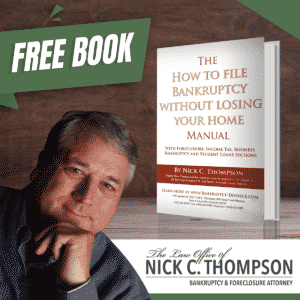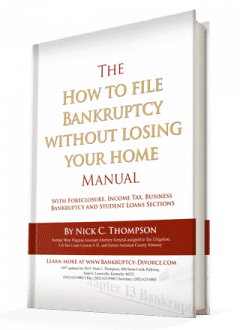This is a Kentucky SBRA small business bankruptcy checklist of items that should be prepared or at least considered before you file an SBRA case. Immediately on the first day of an SBRA bankruptcy, the small business has to file several motions so the company can continue to operate as usual.
Of course, there are several considerations in any SBRA case. In this article, we list the steps a small business must take when re-organizing under the SBRA Chapter 11 Bankruptcy Act.
Small Business Reorganization Act (SBRA) Chapter 11 Bankruptcy
The first day SBRA motions and items.
- Cash collateral motions allow the business to continue to operate. Essential employees =leave the company if they do not receive assurance that you can pay them. However, by filing a cash collateral motion, the business continues to operate and pay small vendors, payroll, and operating expenses. You often need to also attach a budget to explain to the court, trustee, and creditors exactly what these expenses are. The budget also needs to explain the necessity for these expenses.
- The appointment and fees of professionals. If you need an accountant or attorney, the court must approve the appointment and fees of these critical professionals. Without the appointment and approval of their fees, they can’t be paid and will leave or do substandard work.
- Corporation resolution and schedules. At the time of filing, you must include a corporate resolution adopting the bankruptcy filing along with the schedules.
- Bookkeeping and tax returns. Along with the petition, you must also file the bookkeeping and tax returns. See 11 U.S. Code § 1116. Documents include the business’s most recent balance sheet, statement of operations, cash-flow statement, and Federal income tax returns. You can also substitute a statement made under penalty of perjury that there is no preparation of a balance sheet, statement of operations, or cash-flow statement and there is no current filing of a Federal tax return. However, the debtor has all the duties of 1116 sections 2, 3, 4, 5, 6, and 7.
The SBRA initial interview accounting and documentation requirements.
- At the start of the case, the auditor for the US Trustee’s office will need the following documents for the initial interview. Make note that these documents are due two days before the interview. Additionally, you must submit these documents in pdf or electronic formats.
- Bank account statements for the 12 months before a bankruptcy filing. Upon filing, the Debtor is required to close the old business checking accounts and to establish a new checking account with an approved bank. Ask for a list of these approved banks. The new checks are required to have in the heading “Debtor in Possession” to clearly note the business is engaged in a Chapter 11 bankruptcy. The Debtor will provide the trustee with a voided check from each Debtor in Possession checking account with “Debtor in Possession” and the case number on the check heading;
- Three (3) most recently filed federal income tax returns with all attachments;
- Declaration page(s) from each insurance policy maintained by the Debtor with the U.S. Trustee added as a certificate holder;
More accounting and documentation requirements for the initial SBRA interview.
- Most recent monthly Profit and Loss Statement (i) prepared by the Debtor, and (ii) externally prepared;
- Most recent Balance Sheet (i) prepared by the Debtor, and (ii) externally prepared;
- Cash disbursement ledgers (in .xls or .txt format) for the 12 months before bankruptcy filing; and
- Minutes of any board of directors meetings held in the 12 months before a bankruptcy filing.
- Also, you must open a new checking account with approval for the depository. Old checking accounts must close. The new checking accounts must also note the business is operating under Chapter 11 as a “Chapter 11 Debtor in Possession.”
- The Debtor in Possession must also close its books and records as of the petition date and open new books and records.
- The Debtor in Possession must separately account for pre‐and post‐petition accounts receivable and payable in all reporting.
Important initial deadlines.
- We already told you about one of the most critical deadlines on the first day. However, there are additional tasks for the first-day motion filing. First, you must submit a motion for the use of cash collateral as soon as possible. Until you receive approval for this motion, you cannot reopen the business so you must expedite the hearing on this motion. Then, the cash collateral motion grants the approval to spend funds for salaries and operating expenses. The budget you attach should also explain what expenses you will pay from the operating accounts.
- Also, you must file a motion to approve the hiring of professionals. Until this motion receives approval, your attorney and accountants can’t work nor can they receive pay for their work.
- An initial interview takes place within ten days after filing to provide the US Trustee and his auditor with documentation. This meeting goes over several of the duties of the Debtor during Chapter 11 SBRA.
- A status conference is held after this initial interview to discuss with the judge what progress the Debtor is making and defines the goals and duties. This meeting is a requirement by 11 U.S.C. § 1188(a) in an SBRA case. Fourteen days before that status conference, the Debtor must file with the court a report on his efforts to obtain a consensual plan for an SBRA Chapter 11. This report is a requirement by 11 U.S.C. § 1188(c).
- You must file the Chapter 11 plan within 90 days of filing the case. If there is some reason for an extension of the 90 days, it’s important to ask for a delay due to circumstances beyond the Debtor’s control or under which he is not accountable. 11 U.S.C. § 1189(b).
Keep reading! You are only a third of the way through the Kentucky SBRA Small Business Bankruptcy Checklist.
Miscellaneous SBRA deadlines.
- Any special issues in the case including, but not limited to, the appointment of a patient care ombudsman if the business provides health care for its employees or customers should be done before the status conference.
- Whether and when adversary proceedings might be filed.
- A claims bar date.
- A deadline for motions to assume or reject leases and contracts under 11 U.S.C. § 365(d).
- The contents of the Debtor’s Status Conference Report, including efforts made to attain a consensual plan, pursuant to 11 U.S.C. §1188 (c).
- Deadlines for proof of claims and creditors to make elections, if appropriate has to be established under 11 U.S.C. §1111 (b)
Ok, now you are two-thirds of the way through the Kentucky SBRA Small Business Bankruptcy Checklist.
Miscellaneous SBRA duties.
- Taxes and insurance maintenance. Seven days before the initial interview, the Debtor must provide adequate proof of insurance to the trustee. Also, you must change the loss payable to read “ABC corporation debtor in possession” or “Bob Smith debtor in possession” if Chapter 11 is for an individual.
- Monthly operating reports timely filing. You must attach the official Form 425C to any supporting attachments. But,post‐confirmation reports are not a requirement according to Interim Bankruptcy Rule 2015(a)(5). Moreover, these monthly operating reports are due no later than 20 days after the end of the reporting month.
- I understand your SBRA may not be for an individual, but an individual filing must get the approval of a budget. Any income you earn after the start of the case is property of the bankruptcy estate according to 11 U.S.C. § 1115(a)(2). So an individual debtor in possession must provide “notice and a hearing” before using any income for personal living expenses. See 11 U.S.C. § 363(b)(1). The same general idea applies to business. All the profit is property of the estate, and there is a duty to repay the creditors with your best efforts.
- There is also a Duty to Cooperate under 11 U.S.C. § 521(a)(3) with the trustee. Look at the other post we have about the Debtor’s duties under the SBRA.
Now you are through the Kentucky SBRA Small Business Bankruptcy Checklist, but this was just the first 90 days and the start of the case. If your business is facing bankruptcy, call me today at 502-625-0905.
 Resources for Bankruptcy
Resources for Bankruptcy
Louisville Kentucky Bankruptcy Forms
Credit Counseling to Meet Bankruptcy Requirements
Chapter 11 Business Bankruptcy Information
Short Sale Checklist in Louisville Kentucky
List of Debtor Duties in Chapter 13 for Louisville Kentucky
Tax and Bankruptcy Lawyer for Business Trust and Income Tax
If you are thinking about filing bankruptcy, don’t delay because timing is crucial. I am here to help you. So, contact my office right away to start the conversation. Nick C. Thompson, Bankruptcy Lawyer: 502-625-0905.

